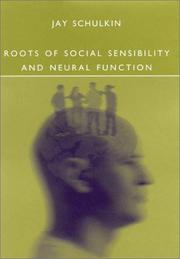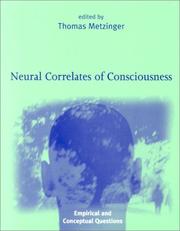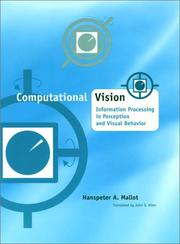| Listing 1 - 10 of 14 | << page >> |
Sort by
|
Book
ISBN: 2744500658 9782744500657 Year: 2000 Volume: *4 Publisher: Paris : De Boeck Université,
Abstract | Keywords | Export | Availability | Bookmark
 Loading...
Loading...Choose an application
- Reference Manager
- EndNote
- RefWorks (Direct export to RefWorks)
Un ouvrage synthétique et pédagogique sur le développement de la pensée de l'enfant. Il propose un nouveau modèle de compréhension du processus de changement dans les modes de pensée de l'enfant et montre l'intérêt d'une perspective évolutionniste, qui s'inspire du modèle biologique de l'évolution, pour comprendre les variations interindividuelles, l'adaptation à un monde en changement...
Kinderpsychologie --- Ontwikkelingspsychologie --- Psychologie de l'enfant --- Psychologie du développement --- Cognition in children --- Cognitive styles in children --- Human information processing in children --- Cognition chez l'enfant --- Styles cognitifs chez l'enfant --- Information, Traitement de l', chez l'enfant

ISBN: 0521789087 0521783313 0511611927 Year: 2000 Publisher: Cambridge, U.K. ; New York : Cambridge University,
Abstract | Keywords | Export | Availability | Bookmark
 Loading...
Loading...Choose an application
- Reference Manager
- EndNote
- RefWorks (Direct export to RefWorks)
How did our minds evolve? Can evolutionary considerations illuminate the question of the basic architecture of the human mind? These are two of the main questions addressed in Evolution and the Human Mind by a distinguished interdisciplinary team of philosophers, psychologists, anthropologists and archaeologists. The essays focus especially on issues to do with modularity of mind, the evolution and significance of natural language, and the evolution of our capacity for meta-cognition (thought about thought), together with its implications for consciousness. The editors have provided an introduction that lays out the background to the questions which the essays address, and a consolidated bibliography that will be a valuable reference resource for all those interested in this area. The volume will be of great interest to all researchers and students interested in the evolution and nature of the mind.
Genetic psychology --- Modularity (Psychology) --- Metacognition --- Psycholinguistics --- Evolutionary psychology --- Psychologie génétique --- Modularité (Psychologie) --- Métacognition --- Psycholinguistique --- Psychologie évolutionniste. --- Congresses --- Congresses. --- Congrès --- Psychologie génétique --- Modularité (Psychologie) --- Métacognition --- Psychologie évolutionniste. --- Congrès --- Cerveau --- Langage --- Ontogenèse --- Phylogenèse --- Arts and Humanities --- Philosophy --- Meta knowledge --- Metamemory --- Cognition --- Self-control --- Self-perception --- Faculty psychology --- Modules (Psychology) --- Human information processing --- Human genetics --- Psychology --- Genetic psychology. --- Psychologie génétique. --- Modularité (psychologie)

ISBN: 0262194473 026228328X 1423726634 9780262283281 9780262194471 9781423726630 Year: 2000 Publisher: Cambridge, Mass. MIT Press
Abstract | Keywords | Export | Availability | Bookmark
 Loading...
Loading...Choose an application
- Reference Manager
- EndNote
- RefWorks (Direct export to RefWorks)
We are social animals, with evolved mechanisms to discern the beliefs and desires of others. This social reason is linked to the concept of intentionality, the ability to attribute beliefs and desires to others. In this book Jay Schulkin explores social reason from philosophical, psychological, and cognitive neuroscientific perspectives. He argues for a pragmatist approach, in which the role of experience--that is, interaction with others--is central to any consideration of action in the social world. Unlike some philosophers of mind, Jay Schulkin considers social reason to be a real feature of the information processing system in the brain, in addition to a useful cognitive tool in predicting behavior. Throughout the book, he incorporates neurobiological evidence for a domain-specific system for social cognition.Topics covered include the centrality of intentional attribution to social cognition, the rise of cognitive science in the twentieth century, the functional argument for the role of experience, intentional understanding in nonhuman primates, theory of mind and natural kinds in children, autism as a disorder of theory of mind, and the integration of emotions into theory of mind.
Cognition --- Cognition and culture --- Human information processing --- Psychology, Comparative --- Psychology --- Social Sciences --- Social aspects --- Cognition and culture. --- Psychology, Comparative. --- Social aspects. --- Behavior, Comparative --- Comparative behavior --- Comparative psychology --- Ethology, Comparative --- Intelligence of animals --- Information processing, Human --- Culture and cognition --- Zoology --- Animal behavior --- Animal intelligence --- Animal psychology --- Human behavior --- Instinct --- Bionics --- Information theory in psychology --- Perception --- Culture --- Ethnophilosophy --- Ethnopsychology --- Socialization --- COGNITIVE SCIENCES/General --- NEUROSCIENCE/General

ISBN: 0262112493 0262276917 058549021X 9780262276917 9780262112499 9780585490212 Year: 2000 Publisher: Cambridge, Mass. MIT Press
Abstract | Keywords | Export | Availability | Bookmark
 Loading...
Loading...Choose an application
- Reference Manager
- EndNote
- RefWorks (Direct export to RefWorks)
These essays draw on work in the history and philosophy of science, the philosophy of mind and language, the development of concepts in children, conceptual change in adults, and reasoning in human and artificial systems.Explanations seem to be a large and natural part of our cognitive lives. As Frank Keil and Robert Wilson write, "When a cognitive activity is so ubiquitous that it is expressed both in a preschooler's idle questions and in work that is the culmination of decades of scholarly effort, one has to ask whether we really have one and the same phenomenon or merely different cognitively based phenomena that are loosely, or even metaphorically, related."This book is unusual in its interdisciplinary approach to that ubiquitous activity. The essays address five basic questions about explanation: How do explanatory capacities develop? Are there kinds of explanation? Do explanations correspond to domains of knowledge? Why do we seek explanations, and what do they accomplish? How central are causes to explanation? The essays draw on work in the history and philosophy of science, the philosophy of mind and language, the development of concepts in children, conceptual change in adults, and reasoning in human and artificial systems. They also introduce emerging perspectives on explanation from computer science, linguistics, and anthropology.ContributorsWoo-kyoung Ahn, William F. Brewer, Patricia W. Cheng, Clark A. Chinn, Andy Clark, Robert Cummins, Clark Glymour, Alison Gopnik, Christine Johnson, Charles W. Kalish, Frank C. Keil, Robert N. McCauley, Gregory L. Murphy, Ala Samarapungavan, Herbert A. Simon, Paul Thagard, Robert A. Wilson
Cognition --- Explanation --- Cognition. --- Explanation. --- Concept Formation. --- Cognitie. --- Verklaring. --- Concept Formation --- Thinking --- Mental Processes --- Psychological Phenomena and Processes --- Psychiatry and Psychology --- Psychology --- Social Sciences --- Psychologic Processes and Principles --- Human Information Processing --- Information Processing, Human --- Critical Thinking --- Thinking Skills --- Thinking Skill --- Thinking, Critical --- Cognitive Function --- Cognitions --- Cognitive Functions --- Function, Cognitive --- Functions, Cognitive --- Concept Formations --- Formation, Concept --- Formations, Concept --- Explanation (Philosophy) --- Psychologic Processes --- Psychological Processes --- Phenomena, Psychological --- Processes, Psychologic --- Processes, Psychological --- Psychological Phenomenas --- Psychological Processe --- Thought --- Thoughts --- Knowledge, Theory of --- COGNITIVE SCIENCES/General --- COGNITIVE SCIENCES/Psychology/Cognitive Psychology --- Épistémologie --- Explication.

ISBN: 0262011816 0262267489 1423727533 0262261359 9780262267489 9780262011815 9780262261357 9781423727538 Year: 2000 Publisher: Cambridge, Mass. MIT Press
Abstract | Keywords | Export | Availability | Bookmark
 Loading...
Loading...Choose an application
- Reference Manager
- EndNote
- RefWorks (Direct export to RefWorks)
Annotation
Cognitive psychology --- Theory of knowledge --- Cognitive science. --- Intellect. --- Thought and thinking. --- Cognition. --- Intelligence. --- Thinking. --- Cognitive science --- Intellect --- Thought and thinking --- Thinking --- Cognition --- Intelligence --- Mental Processes --- Personality --- Psychological Phenomena and Processes --- Behavior and Behavior Mechanisms --- Psychiatry and Psychology --- Psychology --- Social Sciences --- Psychologic Processes --- Psychologic Processes and Principles --- Psychological Processes --- Phenomena, Psychological --- Processes, Psychologic --- Processes, Psychological --- Psychological Phenomenas --- Psychological Processe --- Personalities --- Human Characteristics --- Human Information Processing --- Information Processing, Human --- Cognitive Function --- Cognitions --- Cognitive Functions --- Function, Cognitive --- Functions, Cognitive --- Critical Thinking --- Thinking Skills --- Thought --- Thinking Skill --- Thinking, Critical --- Thoughts --- Mind --- Educational psychology --- Philosophy --- Logic --- Perception --- Psycholinguistics --- Self --- Human intelligence --- Ability --- Science --- Philosophy of mind --- COGNITIVE SCIENCES/General

ISBN: 1281032735 9786611032739 0080542336 0121783553 9780121783556 9780080542331 0121783561 9780121783563 Year: 2000 Publisher: San Diego, CA Academic Press
Abstract | Keywords | Export | Availability | Bookmark
 Loading...
Loading...Choose an application
- Reference Manager
- EndNote
- RefWorks (Direct export to RefWorks)
Tending Adam's Garden describes and explains the way in which our immune system works from a novel perspective. The book uses metaphors and examples to bring the immune system to life and explores the fundamental miracle of nature. Written in plain language for a broad audience, this book encompasses much more than just immunology, exploring more fundamental matters such as causality, information, energy, evolution, cognition and individuality, as well as the strategy of the immune system and its role in health and disease.Key Features* Provides a unique perspective on the i
Immune system. --- Immune system--Popular works. Immunology--Philosophy. Psychoneuroimmunology. --- Immunology. --- Psychoneuroimmunology. --- Immune system --- Immunology --- Psychoneuroimmunology --- Autoimmunity --- Immune System --- Cognition --- Hemic and Immune Systems --- Mental Processes --- Immunity --- Immune System Phenomena --- Anatomy --- Psychological Phenomena and Processes --- Phenomena and Processes --- Psychiatry and Psychology --- Microbiology & Immunology --- Biology --- Health & Biological Sciences --- Philosophy --- Psychologic Processes and Principles --- Anatomies --- Immune System Concepts --- Immune System Phenomenon --- Immune System Process --- Immune System Processes --- Concept, Immune System --- Concepts, Immune System --- Immune System Concept --- Phenomena, Immune System --- Phenomenon, Immune System --- Process, Immune System --- Processes, Immune System --- Disease --- Human Information Processing --- Information Processing, Human --- Hemic System --- System, Hemic --- Cognitive Function --- Cognitions --- Cognitive Functions --- Function, Cognitive --- Functions, Cognitive --- Immune Systems --- System, Immune --- Systems, Immune --- Autoimmune Response --- Autoimmune Responses --- Autoimmunities --- Psychoneuroimmunoendocrinology --- Psychoimmunology --- Immunobiology --- Immunological system --- immunology --- Psychologic Processes --- Psychological Processes --- Phenomena, Psychological --- Processes, Psychologic --- Processes, Psychological --- Psychological Phenomenas --- Psychological Processe --- Seroconversion --- Immunoglobulins --- Autoantibodies --- Autoimmune Diseases --- Neuroimmunology --- Life sciences --- Serology --- Immune Process --- Immune Response --- Immune Processes --- Immune Responses --- Process, Immune --- Response, Immune --- Psychological Phenomena --- Psychiatry --- Philosophy.
Book
ISBN: 0262273616 0585474990 9780262273619 9780585474991 Year: 2000 Publisher: Cambridge, Mass. MIT Press
Abstract | Keywords | Export | Availability | Bookmark
 Loading...
Loading...Choose an application
- Reference Manager
- EndNote
- RefWorks (Direct export to RefWorks)
Cognitive neuroscience --- Brain --- Mental Processes --- Physiology --- Psychological Phenomena and Processes --- Biological Science Disciplines --- Central Nervous System --- Natural Science Disciplines --- Nervous System --- Psychiatry and Psychology --- Anatomy --- Disciplines and Occupations --- Neuroscience --- Human Anatomy & Physiology --- Health & Biological Sciences --- Anatomies --- Nervous Systems --- System, Nervous --- Systems, Nervous --- Natural Sciences --- Physical Sciences --- Discipline, Natural Science --- Disciplines, Natural Science --- Natural Science --- Natural Science Discipline --- Physical Science --- Science, Natural --- Science, Physical --- Sciences, Natural --- Sciences, Physical --- Cerebrospinal Axis --- Axi, Cerebrospinal --- Axis, Cerebrospinal --- Central Nervous Systems --- Cerebrospinal Axi --- Nervous System, Central --- Nervous Systems, Central --- Systems, Central Nervous --- Biologic Sciences --- Biological Science --- Science, Biological --- Sciences, Biological --- Biological Sciences --- Life Sciences --- Biologic Science --- Biological Science Discipline --- Discipline, Biological Science --- Disciplines, Biological Science --- Life Science --- Science Discipline, Biological --- Science Disciplines, Biological --- Science, Biologic --- Science, Life --- Sciences, Biologic --- Sciences, Life --- Psychologic Processes --- Psychologic Processes and Principles --- Psychological Processes --- Phenomena, Psychological --- Processes, Psychologic --- Processes, Psychological --- Psychological Phenomenas --- Psychological Processe --- Human Information Processing --- Information Processing, Human --- Encephalon --- Cognitive neuropsychology --- Cognitive science --- Neuropsychology --- Psychological Phenomena --- Psychiatry --- Occupations

ISBN: 0262133709 0262279738 1423745116 9780262133708 9780262279734 9781423745112 Year: 2000 Publisher: Cambridge, Mass. : MIT Press,
Abstract | Keywords | Export | Availability | Bookmark
 Loading...
Loading...Choose an application
- Reference Manager
- EndNote
- RefWorks (Direct export to RefWorks)
This book brings together an international group of neuroscientists and philosophers who are investigating how the content of subjective experience is correlated with events in the brain. The fundamental methodological problem in consciousness research is the subjectivity of the target phenomenon--the fact that conscious experience, under standard conditions, is always tied to an individual, first-person perspective. The core empirical question is whether and how physical states of the human nervous system can be mapped onto the content of conscious experience. The search for the neural correlates of consciousness (NCC) has become a highly active field of investigation in recent years. Methods such as single-cell recording in monkeys and brain imaging and electrophysiology in humans, applied to such phenomena as blindsight, implicit/explicit cognition, and binocular rivalry, have generated a wealth of data. The same period has seen the development of a number of theories about NCC location. This volume brings together the leading experimentalists and theoreticians in the field. Topics include foundational and evolutionary issues, global integration, vision, consciousness and the NMDA receptor complex, neuroimaging, implicit processes, intentionality and phenomenal volition, schizophrenia, social cognition, and the phenomenal self. Contributors Jackie Andrade, Ansgar Beckermann, David J. Chalmers, Francis Crick, Antonio R. Damasio, Gerald M. Edelman, Dominic ffytche, Hans Flohr, N.P. Franks, Vittorio Gallese, Melvyn A. Goodale, Valerie Gray Hardcastle, Beena Khurana, Christof Koch, W.R. Lieb, Erik D. Lumer, Thomas Metzinger, Kelly J. Murphy, Romi Nijhawan, Joëlle Proust, Antti Revonsuo, Gerhard Roth, Thomas Schmidt, Wolf Singer, Giulio Tononi.
Philosophical anthropology --- Consciousness --- Neuropsychology --- #PBIB:2001.1 --- Neurophysiology --- Psychophysiology --- Apperception --- Mind and body --- Perception --- Philosophy --- Psychology --- Spirit --- Self --- Consciousness. --- Neuropsychology. --- Nervous System Physiological Phenomena --- Musculoskeletal and Neural Physiological Phenomena --- Cognition --- Phenomena and Processes --- Mental Processes --- Psychological Phenomena and Processes --- Psychiatry and Psychology --- Neuroscience --- Human Anatomy & Physiology --- Health & Biological Sciences --- Psychologic Processes and Principles --- Human Information Processing --- Information Processing, Human --- Mind-Body Relationship (Physiology) --- Physiologic Psychology --- Physiological Psychology --- Psychology, Physiologic --- Mind-Body Relations (Physiology) --- Psychology, Physiological --- Mind Body Relations (Physiology) --- Mind Body Relationship (Physiology) --- Mind-Body Relation (Physiology) --- Mind-Body Relationships (Physiology) --- Physiologic Psychologies --- Psychologies, Physiologic --- Relation, Mind-Body (Physiology) --- Relations, Mind-Body (Physiology) --- Relationship, Mind-Body (Physiology) --- Relationships, Mind-Body (Physiology) --- Cognitive Function --- Cognitions --- Cognitive Functions --- Function, Cognitive --- Functions, Cognitive --- Musculoskeletal and Neural Physiological Concepts --- Musculoskeletal and Neural Physiological Phenomenon --- Musculoskeletal and Neural Physiology --- Nervous System Physiological Concepts --- Nervous System Physiological Phenomenon --- Nervous System Physiological Process --- Physiology, Nervous System --- Nervous System Physiologic Processes --- Nervous System Physiological Processes --- Nervous System Physiology --- System Physiology, Nervous --- Nervous System --- Consciousnesses --- physiology --- Psychologic Processes --- Psychological Processes --- Phenomena, Psychological --- Processes, Psychologic --- Processes, Psychological --- Psychological Phenomenas --- Psychological Processe --- Psychosomatic Medicine --- Mind-Body Relations, Metaphysical --- NEUROSCIENCE/General --- PHILOSOPHY/Philosophy of Mind/General

ISBN: 0262133814 0262278952 1423727525 9780262278959 9780262133814 Year: 2000 Publisher: Cambridge, Mass. MIT Press
Abstract | Keywords | Export | Availability | Bookmark
 Loading...
Loading...Choose an application
- Reference Manager
- EndNote
- RefWorks (Direct export to RefWorks)
This text provides an introduction to computational aspects of early vision, in particular, color, stereo, and visual navigation. It integrates approaches from psychophysics and quantitative neurobiology, as well as theories and algorithms from machine vision and photogrammetry. When presenting mathematical material, it uses detailed verbal descriptions and illustrations to clarify complex points. The text is suitable for upper-level students in neuroscience, biology, and psychology who have basic mathematical skills and are interested in studying the mathematical modeling of perception.
Artificial intelligence. Robotics. Simulation. Graphics --- Affective and dynamic functions --- Physiology of nerves and sense organs --- Vision --- Computational neuroscience --- Visual cortex --- Neurosciences informatiques --- Computer simulation --- Models, Biological --- Perception --- Models, Theoretical --- Mental Processes --- Investigative Techniques --- Psychological Phenomena and Processes --- Analytical, Diagnostic and Therapeutic Techniques and Equipment --- Psychiatry and Psychology --- Models, Neurological --- Visual Perception --- Human Anatomy & Physiology --- Health & Biological Sciences --- Neuroscience --- Perception, Visual --- Perceptions, Visual --- Visual Perceptions --- Model, Neurological --- Neurologic Model --- Neurological Model --- Neurological Models --- Neurologic Models --- Model, Neurologic --- Models, Neurologic --- Psychologic Processes and Principles --- Investigative Technics --- Investigative Technic --- Investigative Technique --- Technic, Investigative --- Technics, Investigative --- Technique, Investigative --- Techniques, Investigative --- Human Information Processing --- Information Processing, Human --- Experimental Model --- Experimental Models --- Mathematical Model --- Model, Experimental --- Models (Theoretical) --- Models, Experimental --- Models, Theoretic --- Theoretical Study --- Mathematical Models --- Model (Theoretical) --- Model, Mathematical --- Model, Theoretical --- Models, Mathematical --- Studies, Theoretical --- Study, Theoretical --- Theoretical Model --- Theoretical Models --- Theoretical Studies --- Perceptions --- Biological Model --- Biological Models --- Model, Biological --- Models, Biologic --- Biologic Model --- Biologic Models --- Model, Biologic --- Vision, Ocular --- Psychologic Processes --- Psychological Processes --- Phenomena, Psychological --- Processes, Psychologic --- Processes, Psychological --- Psychological Phenomenas --- Psychological Processe --- Computer Simulation --- Systems Theory --- Sensation --- Computational neuroscience. --- Computer simulation. --- NEUROSCIENCE/General --- NEUROSCIENCE/Visual Neuroscience --- Eyesight --- Seeing --- Sight --- Senses and sensation --- Blindfolds --- Eye --- Physiological optics --- Area striata --- Striate area --- Striate cortex --- Occipital lobes --- Computational neurosciences --- Computational biology --- Neurosciences

ISSN: 1381589X ISBN: 9027251363 1556191960 9781556191961 1282254901 0585461201 9786612254901 902729996X 9789027251367 9780585461205 9789027299963 9781282254909 6612254904 Year: 2000 Volume: 16 Publisher: Amsterdam Philadelphia J. Benjamins Pub. Co.
Abstract | Keywords | Export | Availability | Bookmark
 Loading...
Loading...Choose an application
- Reference Manager
- EndNote
- RefWorks (Direct export to RefWorks)
From a neuropsychological perspective, awareness of emotions is a complex function involving several components (perceptual decoding and conceptualization, memory and attention, and psychophysiological responses). Pathological conditions of the nervous system as well as certain experimental procedures in healthy persons may induce dissociations of these components. It is suggested that perceptual awareness of an emotional stimulus requires a correct stimulus identification as well as input monitoring. Awareness of experiential qualities is a more global function involving integration of interoceptive information, formation of emotional schemas or concepts, and recall of episodic memory of past emotions. Perceptual awareness of internal or external stimulus events can be defined and measured by means of psychophysical methods. Experiental qualities, however, are difficult to assess in a reductionist/physicalist framework.
Cognitive psychology --- Philosophical anthropology --- Consciousness --- Emotions --- Motivation (Psychology) --- Self-organizing systems --- Conscience --- Motivation (Psychologie) --- Systèmes auto-organisés --- Emotional Intelligence --- Behavior and Behavior Mechanisms --- Psychophysiology --- Personality Development --- Cognition --- Psychoanalytic Theory --- Mental Processes --- Intelligence --- Psychological Theory --- Personality --- Ego --- Motivation --- Social Sciences --- Psychology --- Feelings --- Human emotions --- Passions --- Affect (Psychology) --- Affective neuroscience --- Apathy --- Pathognomy --- Disincentives --- Expectations --- Incentives --- Disincentive --- Expectation --- Incentive --- Motivations --- Drive --- Self --- Egos --- Apperception --- Mind and body --- Perception --- Philosophy --- Spirit --- Personalities --- Human Characteristics --- Psychologic Theory --- Psychological Theories --- Theories, Psychological --- Theory, Psychological --- Social Cognitive Theory --- Cognitive Theories, Social --- Cognitive Theory, Social --- Psychologic Theories --- Social Cognitive Theories --- Theories, Psychologic --- Theories, Social Cognitive --- Theory, Psychologic --- Theory, Social Cognitive --- Human Information Processing --- Information Processing, Human --- Psychoanalytical Theory --- Theory, Psychoanalytic --- Oral Character --- Character, Oral --- Characters, Oral --- Oral Characters --- Psychoanalytic Theories --- Psychoanalytical Theories --- Theories, Psychoanalytic --- Theories, Psychoanalytical --- Theory, Psychoanalytical --- Cognitive Function --- Cognitions --- Cognitive Functions --- Function, Cognitive --- Functions, Cognitive --- Development, Personality --- Child Development --- Growth --- Mind-Body Relationship (Physiology) --- Physiologic Psychology --- Physiological Psychology --- Psychology, Physiologic --- Mind-Body Relations (Physiology) --- Psychology, Physiological --- Mind Body Relations (Physiology) --- Mind Body Relationship (Physiology) --- Mind-Body Relation (Physiology) --- Mind-Body Relationships (Physiology) --- Physiologic Psychologies --- Psychologies, Physiologic --- Relation, Mind-Body (Physiology) --- Relations, Mind-Body (Physiology) --- Relationship, Mind-Body (Physiology) --- Relationships, Mind-Body (Physiology) --- Psychosomatic Medicine --- Mind-Body Relations, Metaphysical --- Behavior And Behavior Mechanism --- Social Intelligence --- Emotional Intelligences --- Intelligence, Emotional --- Intelligence, Social --- Intelligences, Emotional --- Intelligences, Social --- Social Intelligences --- Interpersonal Relations --- Learning systems (Automatic control) --- Self-optimizing systems --- Cybernetics --- Intellect --- Learning ability --- Synergetics --- Action, Psychology of --- Drive (Psychology) --- Psychology of action --- Consciousness. --- Emotions. --- Self-organizing systems.
| Listing 1 - 10 of 14 | << page >> |
Sort by
|

 Search
Search Feedback
Feedback About UniCat
About UniCat  Help
Help News
News